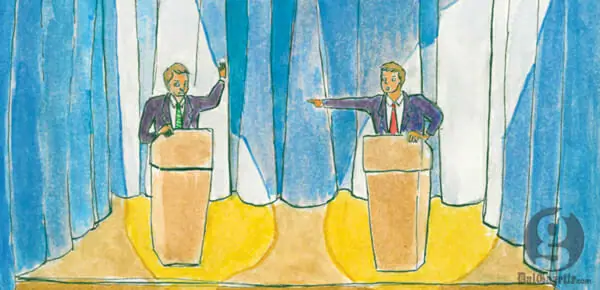
Dalhousie Student Union (DSU) councilors passed a new policy during the Dec. 4 council meeting that will change the way faculty society representatives are elected.
Students will now vote for reps online, and faculty-level societies such as the Dalhousie Arts and Sciences Society, the Dalhousie Engineering Society and the Graduate Students’ Society will elect their executives on the same ballot as candidates in the DSU election.
What the DSU is hoping to accomplish
Jamie Arron, the DSU president, says they decided to change the voting system to get students voting and get them more involved in the DSU.
“All of us [the DSU executive] were elected on a platform of student engagement—making the DSU more relevant to students and more visible,” says Arron.
Previously, faculty societies ran their own voting in whatever way they saw fit. Some faculties, the Dalhousie Undergraduate Engineering Society (DUES) for example, ran voting online on the DSU ballot already. Other faculties, such as the Dalhousie Arts and Social Sciences Society (DASSS), voted by secret ballot at their annual general meeting (AGM).
“It was kind of inconsistent,” says Arron.
Katherine Strynatka, the VP (academic) for DASSS, agrees that the previous system wasn’t perfect. She is a faculty society representative who sits on the DSU council.
Under the previous system, Strynatka says, “Anyone who pays their levy to DASSS can vote, but out of the 4,000 students we represent, usually 30 to 40 is the number that show up at the AGM.”
Arron and Strynatka agree that the way some faculty societies vote isn’t as democratic as it ought to be.
“Oftentimes it’s been done at in-person meetings, so it makes it more difficult for people to go out,” says Arron. “If they happen to have class at that time, they can’t go vote or run.”
“Someone could round up 30 friends to show up and they can get elected president for that society,” he says.
Now, DSU candidates, Board of Governor representatives, Senate representatives and faculty society executives will appear on one online ballot at the same time.
Strynatka says the ballot will be tailored to the student voting.
“If the majority of your classes are in arts, you’d login and you’d see all your options for the DSU candidates and, because you’re an arts student, you would also see the people running for DASSS positions.”
Last year, Arron says DSU elections saw a 13.8 per cent voter turnout. He says the voter turnout rate generally ranges between 14 and 20 per cent.
The drawbacks
Under the new system, students can only run for one executive position at a time. This could cause problems for societies who previously let candidates run for multiple positions—for example, the runners-up for the position of president could fill the other positions.
Arron says the new voting system is designed to get candidates to run for a specific position based on their skill set. But Strynatka worries that the new system will be overwhelming for voters.
“You know when you look at the ballot and you’re like, ‘Oh my goodness there are ten people here and I don’t know any of them’?”
She worries that voters may have a hard time researching all the candidates before voting.
What isn’t changing
Certain faculty societies will be exempt from the policy changes.
“With medicine, they run on a different academic calendar, so most students aren’t actually around in mid-March when the DSU conducts its elections,” says Arron.
Health professions will also be exempt because the faculty is made up of many different smaller groups. It doesn’t have one overarching society that represents the whole faculty.
“Instead,” Arron says, “they have two representatives on the DSU council. So those representatives will be chosen as part of our elections as well.”
The policy changes also won’t affect any of the faculty societies’ campaigning procedures.
For DSU executive positions, students need to campaign for votes under a strict set of rules. The faculty societies will still maintain control over what sort of campaigning and promotion is appropriate.
“It will be interesting to see if this is really what the DSU wanted. They wanted to shake up elections and do something drastically different,” says Strynatka.
The first vote under the new system will happen this March, and Arron says the DSU will review the system in April.

Recent Comments